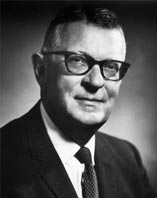Communicator, Don’t Be This Guy
August 10, 2022
A trip into the archives of Vital Speeches turns up a bracing lesson for speechwriters and other communicators today.
“More and more youngsters who come in looking for jobs are asking, ‘What can you do for me?’ rather than, ‘What can I do for you?’ They want to discuss the extras they’re going to get rather than the extras they’re going to give.”
How often do you hear sentiments like that today? How often do you express them?
Yet, this was grumbled by Charles H. Brower, president of the New York advertising giant BBDO, in a speech to the Illinois State Chamber of Commerce in Chicago, October 4, 1962.

I trip over a speech like this just about every time I fulfill an archival request for the 88-year-old magazine, Vital Speeches of the Day. This is why I’d like to devote one year of my early professional dotage to spelunking through every issue of Vital Speeches going back to its founding in 1934—each densely printed page echoing with strange expressions from our ancient leaders—and astonishingly familiar sounds, too.
By turns, this six-decade-old Brower speech offers vivid and contemporarily cautionary examples of both, well crafted as it is by the man who in his heyday was known as “Madison Avenue’s favorite phrasemaker.”
Near the outset, Brower complains that “girls,” which was the standard 1960s term for women employees, “are more interested in filing their nails than in filing what needs to be filed. The other day I overheard two girls in an elevator (not a BBDO elevator, needless to say), and one said to the other, ‘Heavens no, don’t learn shorthand. If you can’t take dictation, you won’t have to stay after 5.’”
The speech is titled “The Return of the Square,” and it gets early to the bone:
Back in Mark Twain’s day, [“square”] was one of the finest words in our language, among the top ten on any lexicographer’s hit parade. You gave a man a square deal if you were honest. You gave a man a square meal when he was hungry. You stood foursquare for the right, as you saw it, and square against everything else. When you got out of debt, you were square with the world. And that was when you could look your fellow man square in the eye.
Then a lot of strange characters got hold of this honest, wholesome word, bent it all out of shape and gave it back to our children. Convicts gave it its first twist. To them a Square was an inmate who would not conform to the convict code. From prisons it was flashed across the country on the marijuana circuit of the bopsters and hipsters. Now everyone knows what a Square is. He is the man who never learned to get away with it. A Joe who volunteers when he doesn’t have to. A guy who gets his kicks from trying to do something better than anyone else can. A boob who gets so lost in his work that he has to be reminded to go home. A guy who doesn’t have to stop at a bar on his way to the train at night because he’s all fired up and full of juice already. A character who doesn’t have to spend his evenings puttering in a basement workshop and his weekends scraping the bottom of a boat because he’s putting all that elbow grease and steam into doing a satisfying job on the job he’s getting paid to do. A fellow who laughs with his belly instead of his upper lip. A slob who gets all choked up when the band plays “America the Beautiful.” A square, strictly from Squaresville.
His tribe isn’t thriving too well in the current climate. He doesn’t fit too neatly into the current group of angle players, corner cutters, sharpshooters and goof-offs. He doesn’t believe in opening all the packages before Christmas. He doesn’t want to fly now and pay later. He’s burdened down with old-fashioned ideas of honestly, loyalty, courage and thrift. And he may already be on his way to extinction.
Brower goes on to lament—remember, this is sixty years ago (before the JFK assassination, the Vietnam War, the Watts race riots or Watergate)—that Americans aren’t patriotic anymore, America doesn’t have any original ideas anymore, Americans aren’t strong of character anymore and Americans can’t read or make art or write anymore. “Non-books are being thrown together and sold by non-writers who never bothered to learn how to write,” Brower thunders. “And murky poemss are being ground out by scraggly poets who sing them to their friends because they are unreadable. … Life magazine describes our beatnik geniuses as ‘fruit flies … some of the hairiest, scrawniest and most discontented specimens of all time, who not only refuse to sample the seeping juices of American plenty and American advance but scrape their feelers in the discordant scorn of any and all who do.’”
He says America doesn’t know what humor is anymore, the only real remaining humorists to his mind being Bob Hope and Art Buchwald. “Others are cynical, sly and bitter.” Thank God, he says, for American astronauts. “These lads apparently lived too far from the big city and grew up to be squares. For who but a square would volunteer his life for the country’s good.”
Like any good speechmaker, Brower knows it’s not sufficient to curse the darkness. One light a candle, in the form a “call to action,” however disingenuous.
May I suggest that we all join the S.O.S.? The S.O.S.—the society of squares. It doesn’t even exist but it could. Not a left-wing organization. Not a right-wing organization. Just an organization with wings!
We might have to go underground for awhile to avoid being trampled to death by the coast-to-coast rat-packs of cynical saboteurs and the canned wit commandos whose devotion is to destruction.
But we would come out.
We might even have a secret handshake consisting mainly of grabbing the other guy’s hand as though you meant it and looking him in the eye.
We would be for participation and against sitting life out … for simplicity and against sophistication … for laughter and against sniggering … for America and against her enemies … for the boys and girls who excel and against the international bedroom athletes …
No wonder advertising is a young man’s game.
This was one of the sort of old-school ad bosses that my own adman dad, a half-generation younger than Brower, chafed under, he and his younger colleagues secretly calling them “old fools in high stools.” These old guys were still writing (and approving) ad headlines like, “The car of tomorrow, today!” And these old guys allowed themselves to slip into the deadly idea that the very upcoming generation that they were paid to communicate with were creeps, and losers.
In my book, An Effort to Understand, I quote a memo my dad wrote three or four years after Broward’s speech, about the very generation Brower disparages:
All of us, as human beings, wear a protective cover or a kind of year-round Halloween mask to keep our nerve endings hidden, to keep our soft underside of hopes and needs and hang-ups, our fears, our pride and prejudices, our irrationalities and our cry buttons from hanging right out there in the sunlight for someone to push in or puncture. And it’s this paper-thin shell that confuses a lot of people in advertising. It’s this shell, when it comes in big sunglasses and long hair, that frightens a lot of us over thirty, and worse, fools us into thinking that it’s not just a shell at all, but a whole new and different kind of person in there. And if we hear the shell express some new idea or value—or speak or sing in some strange new language, we strain to hear what was said and try to play back our communication in the same way with the same words. We try, in other words, to communicate with the shell instead of the she or he inside. …
I can assure you from personal experience that today’s young people, however sober, serious, callous, arrogant, flip, or freaked out they might appear on the surface, still cry quietly in the bathroom when a pimple appears at prom time, or when they feel unloved or unsure (which they really do most of the time) or threatened or confused by some of the problems that confront them. I believe that honor and justice and truth and logic mean as much to them as to you and me—maybe more. I believe that beneath the shell they are simply “young people” (and it’s important to pause between those words “young” and “people” to fully grasp what these two words mean), who, in the main, respond logically to logic, lovingly to love, and honestly to truth.
Alas, nobody was more square than my dad, and believe me, by the time I needed this kind of calm, philosophical understanding and empathy, twenty years after he wrote this memo—I was part of his second set of kids—he didn’t have much of it to offer to a teenage boy. And I understand. Already at 53, it often occurs to me that there’s a reason we only live 80 years or so in this world. Whether in style or substance, the human parade does ask us to stand and cheer at a lot of increasingly far-out floats. (And it’s just hard to get one’s adult mind into a young sensibility. Sez a traveling soccer dad who spent all of last summer listening to Olivia Rodrigo and trying with limited success not to grind his teeth.)
But the day you start allowing yourself to think of the next generation as qualitatively inferior to yours is the day after you should have hung it up as a professional communicator and joined your old cronies with a standing tee time at the local golf course.
Maybe you can call yourselves, “The Society of Squares.”




